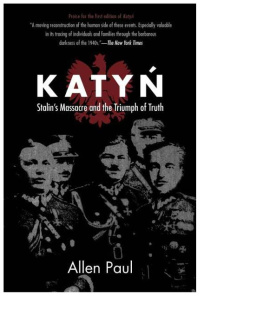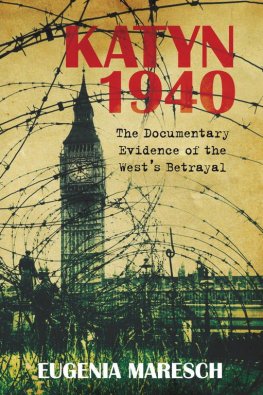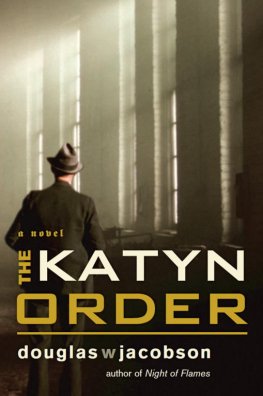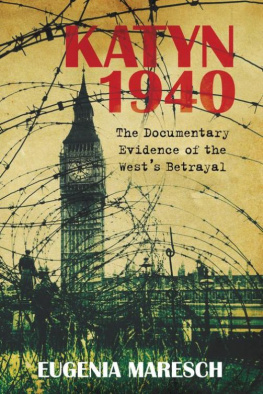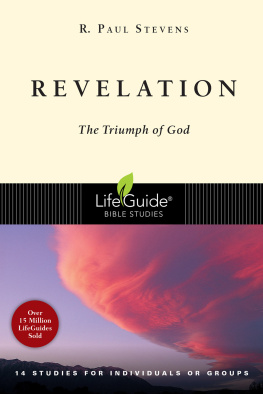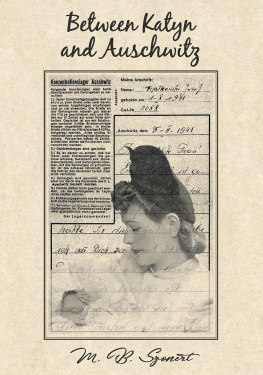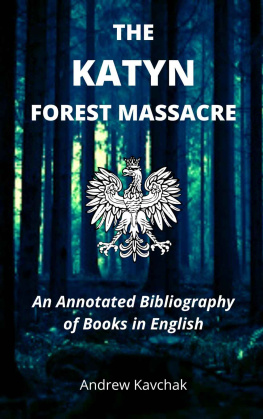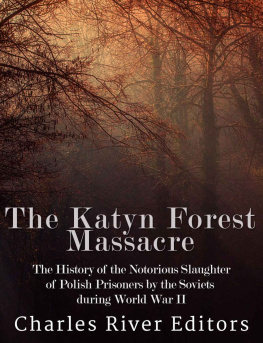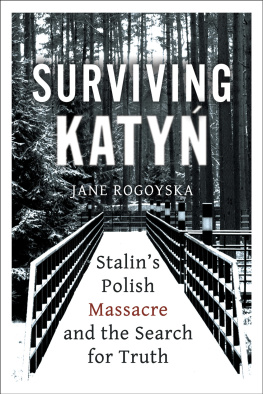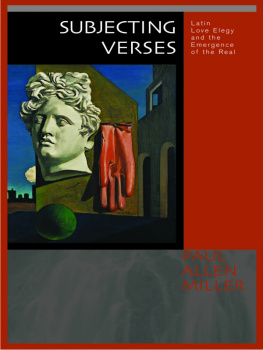Allen Paul - Katyn: Stalin’s Massacre and the Triumph of Truth
Here you can read online Allen Paul - Katyn: Stalin’s Massacre and the Triumph of Truth full text of the book (entire story) in english for free. Download pdf and epub, get meaning, cover and reviews about this ebook. year: 2010, publisher: Cornell University Press, genre: Non-fiction. Description of the work, (preface) as well as reviews are available. Best literature library LitArk.com created for fans of good reading and offers a wide selection of genres:
Romance novel
Science fiction
Adventure
Detective
Science
History
Home and family
Prose
Art
Politics
Computer
Non-fiction
Religion
Business
Children
Humor
Choose a favorite category and find really read worthwhile books. Enjoy immersion in the world of imagination, feel the emotions of the characters or learn something new for yourself, make an fascinating discovery.
- Book:Katyn: Stalin’s Massacre and the Triumph of Truth
- Author:
- Publisher:Cornell University Press
- Genre:
- Year:2010
- Rating:3 / 5
- Favourites:Add to favourites
- Your mark:
- 60
- 1
- 2
- 3
- 4
- 5
Katyn: Stalin’s Massacre and the Triumph of Truth: summary, description and annotation
We offer to read an annotation, description, summary or preface (depends on what the author of the book "Katyn: Stalin’s Massacre and the Triumph of Truth" wrote himself). If you haven't found the necessary information about the book — write in the comments, we will try to find it.
Allen Paul: author's other books
Who wrote Katyn: Stalin’s Massacre and the Triumph of Truth? Find out the surname, the name of the author of the book and a list of all author's works by series.
Katyn: Stalin’s Massacre and the Triumph of Truth — read online for free the complete book (whole text) full work
Below is the text of the book, divided by pages. System saving the place of the last page read, allows you to conveniently read the book "Katyn: Stalin’s Massacre and the Triumph of Truth" online for free, without having to search again every time where you left off. Put a bookmark, and you can go to the page where you finished reading at any time.
Font size:
Interval:
Bookmark:

Praise for the first edition of Katy
Paul marshals an impressive array of research gathered from unpublished documents, monographs and interviews to support his interpretations. The detailed personal experiences of three Polish families woven through the text transform what otherwise would be a standard historical narrative into a poignant testimony to the remarkable capacity of human beings to endure tyranny in its most inhumane form. The Washington Post
As Allen Paul makes plain in his often moving history of the Katy massacres, Stalins execution order was a deliberate attempt to eliminate the Polish educated classes and clear the ground for eventual Soviet dominance of the country. The New York Review of Books
Vividly written, intensely personal and passionately anti-Soviet. St. Louis Post-Dispatch
A masterful chronicle Paul tenaciously tracks the Katy cover-up and its festering repercussions. Publishers Weekly
Powerful examination. Well researched and ably written: a fine and harrowing study. Kirkus Reviews
A formidable undertaking well crafted and easy to read. The Polish Review
Allen has given us the complete story of Katy. A wonderful companion to my film!Andrzej Wajda, Academy Award-winning Director of Katy
Poles everywhere fell in love with this book.Twice a bestseller in Poland.Malgorzata Maruszkin, PublisherNon-Fiction, Bertelsmann/Poland
KATY
Stalins Massacre and the Triumph of Truth
Allen Paul
NIU PRESS DeKalb
Copyright 1991, 1996, 2010 by Allen Paul
Published by the Northern Illinois University Press, DeKalb, Illinois 60115
Manufactured in the United States using postconsumer-recycled, acid-free paper.
All Rights Reserved
Design by Shaun Allshouse
Originally published in 1991 by Charles Scribners Sons
Northern Illinois University Press updated paperback edition 2010
Library of Congress Cataloging-in-Publication Data
Paul, Allen (M. Allen), 1939
Katyn : Stalins massacre and the triumph of truth / Allen Paul. Northern Illinois University Press updated pbk. ed.
p. cm.
Originally published in 1991 by Charles Scribners SonsT.p. verso.
Includes bibliographical references and index.
ISBN 978-0-87580-634-1 (quality pbk. : alk. paper)
1. Katyn Massacre, Katyn, Russia, 1940. 2. World War, 19391945Poland. 3. World War, 19391945Atrocities. 4. Polish peopleCrimes againstRussia (Federation)KatynHistory20th century. 5. Prisoners of warCrimes againstRussia (Federation)KatynHistory20th century. 6. Victims of crimesPolandBiography. 7. FamiliesPolandBiography. I. Title.
D804.S65P378 2010
940.5405094727dc22
2010002292
To Betsy
Contents
Katy Forest Execution Order
Preface
But for an accident of nature, Soviet president Mikhail S. Gorbachev might never have acknowledged, as he did on April 13, 1990, his nations guilt for a series of crimes now symbolized by the word: Katy. On that same day forty-seven years earlier, Germany announced its discovery of thousands of Polish officers who had been shot and buried in a scenic glade overlooking the Dnieper (or Dnepr) River near Smolensk. Fate alone accounted for the finding of these bodies. Weeks earlier a wolf, digging in a mound, had uncovered human bones a short distance from the headquarters of the Wehrmachts 537th Signal Regiment.*
By pure happenstance the Germans had stumbled onto one of the great propaganda opportunities of the war, and they exploited it skillfully to divide the Allies at a pivotal point in the conflict. From that moment, prospects for an independent postwar Poland were set on the road to oblivion, and Katy, like an evil star, glowed over the injustice that befell that luckless land.
Gorbachevs revelation was remarkable in many respects despite recent attempts in Russia to discredit it. For nearly half a century, the Soviets had steadfastly maintained their innocence and taken extraordinary measures to defend it. Stalin himself told the Poles in 1941 that their men must have escaped to Manchuria. That fifteen thousand men from three widely separated camps west of the Volga could make their way undetected across Siberia-this, of course, was preposterous, and the Poles knew it. But what could they do? The Hitler-Stalin partnership, which cost them their country, had suddenly become a bloodbath; swallowing their pride, the Poles had just made an uneasy agreement with Stalin to organize an army in Russia to fight Hitler. Over the next months, they anxiously searched for their missing men, but faced Soviet dissembling at every turn. Then came the German discovery and the truthful accusation that the Bolsheviks had murdered the men shortly after their capture during the Nazi-Soviet invasion of 1939. Overnight the Soviets feigning of ignorance in the plight of their own prisoners was replaced by a specific explanation: The Poles, they said, had been engaged in construction work and fell into the hands of German-Fascist hangmen when Soviet troops withdrew from the Smolensk area in the summer of 1941.
Even so, the bodies of men from only one of the three campsless than a third of those held at those installationshad been found. Where were the others? We now know that a total of 21,857 persons were shot, including 7,305 who were not in the three so-called Special Camps but at scattered camps and prisons of what are now western Ukraine and western Belorussia. On the question of where these men were, the Soviets remained silent for nearly half a century. Nor were the Soviets alone in suppressing evidence of their guilt. Churchill and Roosevelt aided Stalin greatly in this regard. Both were aware of convincing circumstantial evidence of Soviet guilt. Both knew that the controversy had been twisted by Stalin into an excuse for breaking off diplomatic relations with the government of Poland. Both knew that massive deportations had been carried out in eastern Poland in an effort to Sovietize the region. Both knew Stalin was grooming a puppet regime to replace the legitimate government. But both men feared, especially in 1943, that Stalin might sign a separate peace with Hitler. They knew also that their first war aimthe crushing of the German Reichwould be a much more difficult task without Soviet manpower and economic resources. That Big Three unity should be compromised for any reason thus became unthinkable to both leaders. If preserving unity meant turning a blind eye to Katys mountain of evidence against the Soviets, then so be it.
Such expediency, no matter how justified by the ends to be achieved, carried a price. On May 24, 1943less than six weeks after the Germans announced their discovery of the gravesSir Owen OMalley, the British ambassador to the London-based Polish government-in-exile, wrote in a confidential memorandum for the British War Cabinet:
We have in fact perforce used the good name of England like the murderers used the little conifers to cover up a massacre.... May it not be that we now stand in danger of bemusing not only others but ourselves; of falling... under St. Pauls curse on those who can see cruelty and burn not?... It may be that the answer lies, for the moment, only in something to be done inside our own hearts and minds where we are masters.... If the facts about the Katyn massacre turn out to be as most of us incline to think, shall we vindicate the spirit of these brave unlucky men and justify the living to the dead.Here, then, we have the contours of a large and complex crime. It provides a wide field of vision for the tragedy of Poland and for a great moral dilemma that confronted the Allies over the last half of the war. Yet these motifs are only part of the story. Equally if not more fascinating are the details and drama of the human lives swept up in this calamity: how the victims met their fates; why and how they were liquidated; the exceptional professional qualities of those murdered; the brutal hardship faced by so many of their families; and, ultimately, a half century of individual struggles for justice in what truly may be called a crime against a nation and humanity.
Next pageFont size:
Interval:
Bookmark:
Similar books «Katyn: Stalin’s Massacre and the Triumph of Truth»
Look at similar books to Katyn: Stalin’s Massacre and the Triumph of Truth. We have selected literature similar in name and meaning in the hope of providing readers with more options to find new, interesting, not yet read works.
Discussion, reviews of the book Katyn: Stalin’s Massacre and the Triumph of Truth and just readers' own opinions. Leave your comments, write what you think about the work, its meaning or the main characters. Specify what exactly you liked and what you didn't like, and why you think so.

